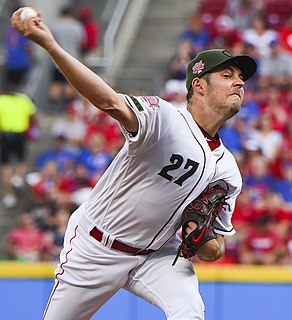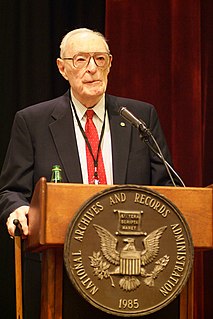A Quote by Richard Hamming
If you want to think new thoughts that are different, then do what creative people do - get the problem reasonably clear and then refuse to look at any answers until you've thought the problem through carefully how you would do it, how you could slightly change the problem to be the correct one.
Related Quotes
...Stop blaming me, thinking I'm the problem. If you think I'm the problem, then you have to change me. If you realize that you're the problem, then you can change yourself, learn something and grow wiser. Most people want everyone else in the world to change themselves. Let me tell you, it's easier to change yourself than everyone else.
You know how it always is, every new idea, it takes a generation or two until it becomes obvious that there's no real problem. It has not yet become obvious to me that there's no real problem. I cannot define the real problem, therefore I suspect there's no real problem, but I'm not sure there's no real problem.
Obviously cheap sentimentality isn't something any good novelist wants to traffic in, but I think it's a problem if you consider it to be the most egregious of all creative sins. I think it's a problem if you consider it the thing to be avoided at all cost. I think it's a problem of you're not willing to risk the consequences of that kind of emotionalism under any circumstances. Then you wind up in the cul-de-sac of irony.
It's my opinion that, if Barack did want to solve the gang problem, number one would be to work with people from the inside out, people who can actually give him an accurate analysis of the problem in L.A., because they're in it or at one point were a part of it, and now they're workin' to change it, and redirect the energy and the focus of it. And then consciously take steps to solve the problem.
It's my opinion that, if Barack did want to solve the gang problem, number one would be to work with people from the inside out, people who can actually give him an accurate analysis of the problem in L.A., because they're in it or at one point were a part of it, and now they're workin' to change it, and redirect the energy and the focus of it. And then consciously take steps to solve the problem. But I don't feel like zero tolerance, strict laws, locking everybody up is a viable means to stop that problem.
If we want to impact hundreds - or millions - of people, we have to do things differently. If we look at the problem as an infrastructural problem, we cannot make an impact because it requires a lot of effort. But when we convert this problem into a knowledge problem, suddenly the problem is manageable.
Anytime we think the problem is 'out there,' that thought is the problem. We empower what's out there to control us. The change paradigm is 'outside-in' - what's out there has to change before we can change. The proactive approach is to change from the 'inside-out': to be different, and by being different, to effect positive change in what's out there - I can be more resourceful, I can be more diligent, I can be more creative, I can be more cooperative.
For the problem of decision-making in our complicated world is not how to get the problem simple enough so that we can all understand it; the problem is how to get our thinking about the problem as complex as humanly possible--and thus approach (we can never match) the complexity of the real world around us.
Habits of thought lead us to brush aside descriptions of cruelty to animals as emotional, for "animal-lovers only"; or if not that, then anyway the problem is so trivial in comparison to the problems of human beings that no sensible person could give it time and attention. This too is a prejudice - for how can one know that a problem is trivial until one has taken the time to examine its extent?
The problem is not gun possession; the problem is manufacturing guns - who's making these guns and how they gettin' out on the street? There shouldn't even be guns for us to possess. If there wasn't any, then it wouldn't be a problem. So we need to go to the source of the problem. They're making all these wars so they can make more weapons and sell them, and they wanna kill more people - they need population control,'cause people have to die in order for this world to continue. That's the government's goal right now.






































